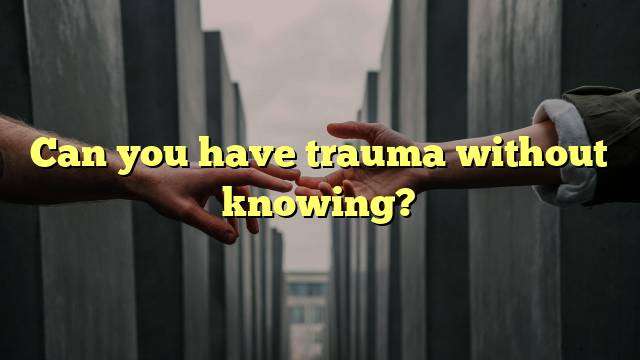Can You Have Trauma Without Knowing?
Trauma can happen to anyone. It can be physical, mental, or emotional. Yet, many people don’t realize that they have had a traumatic experience, because they assume “a trauma” is only something dramatic, or something that drastically changes their world. The truth is, trauma can take many forms – and it doesn’t always require a major life shift for someone to experience it.
Types of Trauma
Trauma can take many different forms, and it can have lasting impacts on someone’s life, even if they don’t realize it. Here are some examples of the types of trauma someone may experience:
- Accidents – This can include car accidents, slips and falls, or any other kind of accident. Even if someone is not injured, the experience can be traumatic.
- Violence – This can include physical, emotional, or sexual violence. Even if someone is not directly affected by it, witnessing violence can still be traumatizing.
- Bullying – Bullying can take many forms, and it can be both physical and emotional. It can lead to long-lasting trauma, even if it doesn’t seem like a big deal at the time.
- Natural Disasters – Natural disasters can be traumatic, even if someone is not directly affected by them. For example, someone may live in an area that is affected by a hurricane, but they are not directly in the path of the storm. However, they may still experience the emotional trauma of living in an area that is affected by a natural disaster.
Signs of Trauma
Sometimes people don’t realize that they have experienced trauma, but there are signs that can indicate that someone has experienced a traumatic event. Here are some of the signs that someone may be experiencing trauma:
- Anger – People who have experienced trauma can become easily angered, even in situations that don’t typically cause anger. They may also be easily triggered, and it may take a while for them to calm down.
- Fear – People who have experienced trauma may become easily scared or anxious in situations that don’t typically cause fear. They may also become easily startled, or may be on edge for seemingly no reason.
- Depression – People who have experienced trauma may experience depression, even if it’s not related to a traumatic event. They may also find it difficult to be happy or enjoy life, even in situations that should be enjoyable.
- Flashbacks – People who have experienced trauma may experience flashbacks of the event. These flashbacks can be vivid and can cause distress. They may also experience nightmares or intrusive thoughts related to the event.
Treatment for Trauma
If someone has experienced trauma, it is important to seek treatment. Treatment can help someone process the event, and it can also help them manage any symptoms they may be experiencing. Here are some of the treatments that may be recommended for someone who has experienced trauma:
- Cognitive Behavioral Therapy (CBT) – CBT is a type of therapy that can help someone change their thoughts and behaviors. It can help someone process the trauma and learn to manage their symptoms.
- Exposure Therapy – Exposure therapy is a type of therapy that can help someone confront their fears. It can help them learn to cope with their trauma and manage any triggers that may be associated with it.
- Medication – Medication can be used to help manage symptoms of trauma, such as anxiety and depression. Medication can also help someone manage their emotions, and it can help them sleep better.
- Support Groups – Support groups can be a great source of comfort and support for someone who has experienced trauma. It can help them feel less alone and can provide a safe space to talk about their experiences.
Living With Trauma
Living with trauma can be difficult, but it is possible. It is important to seek help if you think you may have experienced trauma. Talking to someone can help you process your experiences and learn to manage your symptoms. It is also important to take care of yourself, and to do activities that make you feel good. Taking care of yourself can help you cope with your trauma, and it can help you find peace and healing.
